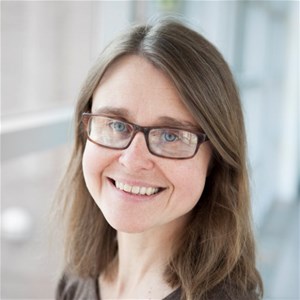En utvärdering av studenters uppfattningar om simulering som pedagogisk modell för inlärning av vårdande moment såsom bedömning och behandling enligt ABCDE
Maria Spante, Monica Egelström, Susanne Hofling, Sussie Källerfelt
Antingen stödjer din webbläsare inte javascript, eller är javascript inaktiverat. Denna webbplats fungerar bäst om du aktiverar javascript.

Senior Lecturer
Docent
Guided by curiosity regarding human interaction and communication in various technical systems, I have participated in a range of projects. These projects have, in different ways, studied how humans have been more or less successful in their strive to accomplish things together when interacting with or via technical systems to solve specific tasks, create specific products and create new possibilities for learning.
Increasingly, the research is conducted with an action research approach with a special interest in work-integrated learning, user-driven innovation and co-design processes as well as studies regarding consequences of the use of digital tools and systems in learning situations.
Furthermore, theoretical interest in Cultural-Historical Activity Theory (CHAT) has become more intense as well as methodological work with formative interventions specifically with the method Change Laboratory (CL).
Publications
Maria Spante, Monica Egelström, Susanne Hofling, Sussie Källerfelt
Monica Egelström, Maria Spante
Maria Spante, Anita Varga, Monica Egelström
Kristina Brocker, Martin Dalenius, Maria Spante
Anita Varga, Maria Spante
Maria Spante, Anita Varga, Helena Korp
Maria Spante, Anita Varga, Helena Korp, Henrik Lind, Lars Jansson, Björn Lindeberg, Ann-Helen Adler Johannesson
Maria Spante, Sylvana Sofkova Hashemi, Mona Lundin, Anne Algers
Maria Spante
Sylvana Sofkova Hashemi, Maria Spante
Kristina Johansson, Maria Spante
Maria Svedäng, Maria Spante
Sylvana Sofkova Hashemi, Maria Spante
Maria Spante, Ilona Heldal, Ann-Sofie Axelsson, Ralph Schroeder
Ilona Heldal, Maria Spante
Ann-Sofie Axelsson, Diane Sonnenwald, Maria Spante
Maria Spante
Maria Spante
Maria Spante
Ulrika Lundh Snis, Anna Sigridur Islind, Maria Spante
Maria Svedäng, Maria Spante
Lena Pareto, Maria Spante, Sara Willermark
Lena Pareto, Bent Lindhardt, Leif Vejbaek, Tor Arne Wølner, Karsten Gynther, Maria Spante
Maria Spante, Ulrika Lundh Snis, Pia Svanberg
Maria Spante
Maria Spante, Monica Egelström
Maria Spante
Monika Hattinger, Maria Spante
Maria Spante
Maria Spante
Maria Spante, Elisabeth Näverå
Thomas Winman, Maria Spante, Sara Willermark, Lars Svensson, Ulrika Lundh Snis
Maria Spante, Karl Alfredsson
Maria Spante
Rashid Ali, Summara Ashgar, Maria Spante, Sung Won Kim, Byung-Seo Kim
Lena Pareto, Karsten Gynther, Bent Lindhardt, Maria Spante, Leif Vejbaek, Tor Arne Wølner
Maria Spante, Elisabeth Näverå
Christina Mauléon, Maria Spante
Ilona Heldal, Maria Spante, Mike Conell
Thommy Eriksson, Maria Spante, Sven Andersson
Ilona Heldal, Ralph Schroeder, Ann-Sofie Axelsson, Maria Spante, Josef Wideström
Maria Spante
Maria Spante, Ralph Schroeder, Ann-Sofie Axelsson
Anne-Mette Nortwig, Rene.B. Christiansen, Asgjerd Vea Karlsen, Maria Spante, Kurt Wicke
Maria Spante, Asgjerd Karlsen, Anne-mette Nortvig, Rene Christiansen
Maria Spante, Asgjerd Karlsen, Anne-Mette Nortvig, Rene Christiansen
Said Morad Babaheidari, Lena Pareto, Maria Spante, Lars Svensson
Maria Spante, Pia Svanberg
Bodil Sundberg, Maria Spante, Jörgen Stenlund
Research projects